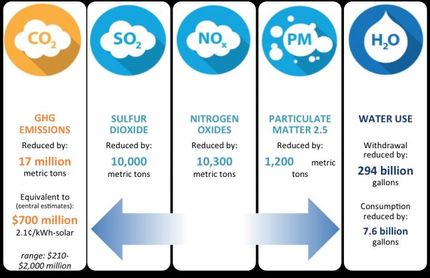Can solar energy help save Greece?
Perspective on solar sector's potential role in recovery
What happens to renewable energy programs in a country that gets whacked by a full-scale debt crisis, like the one that struck Greece beginning in 2009 -- do the programs whither and die in the winds of austerity? And how do people view such programs when many of them can't afford to heat their houses?
The answers to these two questions are actually linked, according to a new analysis in the Journal of Renewable and Sustainable Energy.
Renewable energy programs, particularly solar, may be more relevant than ever in Greece and could lower domestic energy costs while providing an export commodity that would help to ameliorate the economic crisis -- but only if public concerns are addressed, according to Daniel Knight of the London School of Economics, who did the analysis with Sandra Bell of Durham University in the U.K.
Knight and Bell found that one of the major unmet challenges facing the solar industry in Greece is a public that has become dubious of programs that involve international companies, foreign government and banking forces outside their borders. Addressing those public concerns is crucial to realizing solar's potential, said Knight.
"It is necessary to understand not only the role of government policy but also to think about social relations and historical consciousness among Greeks," Knight said.
Perspective on the Greek street: What policy makers need to understand
When the global recession spilled over up into a full-scale national debt crisis in 2010, Greece was squeezed by oil and gas prices that were reaching record highs while household incomes were falling fast. Parts of the country were returned to pre-modernity almost overnight, Knight said.
The effects of the crisis as felt were also profound. Today many Greeks can no longer afford to run cars, cook dinner or heat their homes, and last winter people regularly burned old furniture, clothes and plastics to stay warm. The illegal harvesting of firewood is rampant and environmentally-destructive lignite ('dirty coal') is the primary source of energy in Greece, he added.
Applying the methods of anthropology research, Knight lived with locals in central Greece for extended periods over the past two years to understand the influence of communities on renewable energy initiatives in Greece and both he and Bell interviewed homeowners, farmers, local government officials, engineers and renewable energy entrepreneurs, scrubbed archives and tracked media stories.
Many of the people they spoke with, including some energy providers and wholesalers, acknowledge that Greek solar initiatives in their current form are unsustainable and that policy changes will be needed in the future. But they also found that the government and the European Union (EU) as a whole are very poor at communicating policy to the local level, leaving people to discover energy initiatives by word of mouth.
Historically this has caused solar power to be clouded by suspicion, as many mainstream Greeks have feared that a rapidly privatizing energy sector would come to exploit them. Some people they spoke with said that they already felt compelled to put solar panels on their agricultural land, due to strict EU, International Monetary Fund and European Central Bank austerity measures.
These sorts of fears are not helped by overlapping national and EU policies that are changing constantly, Knight said, and a general failure to communicate such changes to people at the local level.
"Resistance to renewable energy programs and policies is often deeply rooted in local history and culture," Knight said, "and this context must be appreciated if solar initiatives are to be successful and sustainable in the long-term."
Other news from the department science

Get the chemical industry in your inbox
By submitting this form you agree that LUMITOS AG will send you the newsletter(s) selected above by email. Your data will not be passed on to third parties. Your data will be stored and processed in accordance with our data protection regulations. LUMITOS may contact you by email for the purpose of advertising or market and opinion surveys. You can revoke your consent at any time without giving reasons to LUMITOS AG, Ernst-Augustin-Str. 2, 12489 Berlin, Germany or by e-mail at revoke@lumitos.com with effect for the future. In addition, each email contains a link to unsubscribe from the corresponding newsletter.
Most read news
More news from our other portals
Last viewed contents





























































